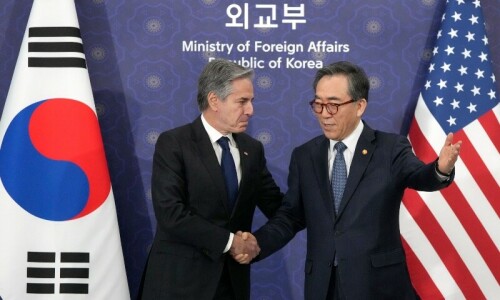ISLAMABAD: With fuel stocks plummeting to a historic low of less than two-day coverage and the Pakistan State Oil (PSO) cancelling shipments for May, the electricity crisis may aggravate and go out of hand in the coming three peak summer months.
Anticipating the worst power crisis, the government came up on Wednesday with an innovative offer to a group of 10 independent power producers (IPPs) to put on hold their financial claims for two months and run their plants to full capacity against direct fuel supplies to them on credit.
“Practically, it is a two-way short-term moratorium on cash payments. The IPPs will not pay anything to fuel suppliers and run their plants to full capacity without getting payments for electricity they sell to the power system. The government will be responsible to meet their fuel requirements,” a senior official told Dawn after talks between IPPs and a government team, led by the Minister for Water and Power, Dr Musadik Malik.
The government said it would be ready to put in place an automatic mechanism for the IPPs to get full payments for the electricity they would supply over the next two months along with partial payments for the past arrears in July, at the beginning of the next fiscal year.
The IPPs’ response was largely positive, but they sought two days to consult their foreign investors, financiers and lawyers before making a commitment because the proposed arrangement is not covered by the existing power purchase agreements.
They were given an assurance that the government would take care of the Federal Board of Revenue in case it raised tax demands on the basis of credit-based power generation.
According to a petroleum ministry official, in response to the Water and Power Development Authority’s request for augmenting fuel supplies for peak summer, the petroleum ministry and the PSO had given a deadline of April 22 for a commitment of cash payment or an undertaking by the finance ministry to enable the PSO to order fuel imports.
“By the deadline, neither we heard anything about payments nor received a response from Wapda,” he said.
The official said that the PSO had not placed orders for fuel import for May and had cancelled two tenders it had already issued because it did not have money at its disposal and the banks had declined to extend credit line for opening a letter of credit.
“As a result, the oil stocks for power generation have dropped to an average of just two days of power generation requirement at a reduced level. At some stations, the fuel stocks have been exhausted, while they are for four days at a couple of locations, but on an average the stocks are just for two days,” he said.
The maximum fuel supplies to the power sector currently are 18,000 tons per day against a requirement of about 30,000 tons to overcome electricity shortage. Wapda is not paying even for 5,000 tons per day. The group of IPPs set up under the 2002 power policy that held talks with the power minister included the Orient, Sapphire, Saif, Hubco Narowal, Foundation, Attock, Halmore, Nishat Chunia and Pakgen plants. They told the minister that their receivables had gone beyond Rs80 billion, their gas supplies had been disconnected due to non-payment and they were unable to procure oil because of cash constraints.
Hence most of the plants are either closed or running at sub-optimal levels.
The minister said the caretaker prime minister had been requested to urgently provide Rs150bn to make arrangement for direct fuel supplies to the IPPs.
Under the proposed mechanism, the power ministry will open letters of credit for oil import on behalf of the PSO. The organisation will be bound to supply fuel to the IPPs in order of priority based on their efficiency.
The IPPs said they were planning to put more investments into the power sector for future generation, but their foreign financiers were disturbed over non-payments and “unprofessional attitude” of the government in clearing their dues.
They also complained about gas supplies to captive power plants of the industrial sector at subsidised rates, although they were running at 18-25 per cent efficiency and selling their electricity to power companies at higher rates, while IPPs having 60 per cent efficiency had been forced to shut down their plants due to gas supply disconnection and furnace oil shortage.
The power minister assured the IPPs that about 150 million cubic feet daily of gas would be diverted to them so that about 11,000MW of additional capacity could be brought into use. “The government is planning to generate maximum electricity from efficient plants instead of inefficient plants by ensuring supply of oil and gas to them,” he said, adding that the issue of loadshedding could be resolved if right steps were taken.










































Dear visitor, the comments section is undergoing an overhaul and will return soon.